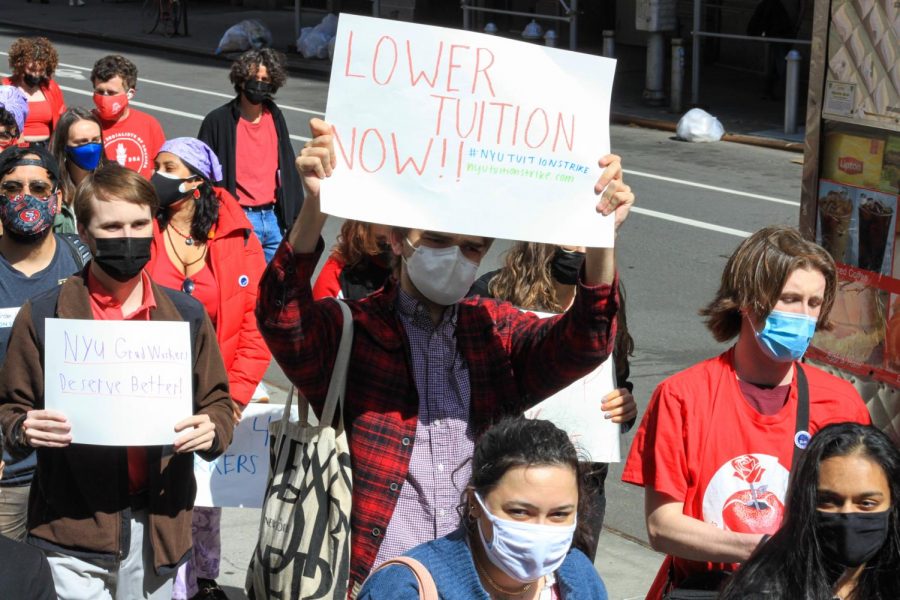NYU YDSA cancels tuition strike after failing to garner student interest
Organizers called off a tuition strike intended to pressure the university into yielding to student demands for increased affordability and transparency. The strike failed to achieve its goal of mobilizing 5,000 students.
Students with NYU’s Young Democratic Socialists of America protest for lower tuition on April 30. The organization’s spring 2021 tuition strike was cancelled due to insufficient mobilization and concerns over participant safety. (Staff Photo by Alexandra Chan)
November 10, 2021
NYU’s chapter of the Young Democratic Socialists of America canceled plans for a spring 2022 tuition strike on Nov. 4 after failing to reach 5,000 participants, a threshold the organization had set for determining the strike’s viability.
NYU YDSA leaders said that the 5,000-student “critical mass” was established in order to protect participants from disenrollment since it would place sufficient pressure on the university. The strike had originally been planned for the fall 2021 semester but was later delayed to spring 2022 to allow more time for organizing.
When the strike was first announced, NYU YDSA included a list of demands calling on NYU to reduce its cost of attendance, increase financial aid, bargain in good faith with employee unions, sever ties with the New York City Police Department and commit to equitable investments.
Strike organizers said they had always been prepared to call off the strike. NYU YDSA co-chair and CAS sophomore Erin Lawson said the chapter had decided early on that they would cancel the strike if their goal of 5,000 strikers wasn’t reached.
“It was simply a matter of lack of momentum and miscommunication about the dangers of striking,” Lawson said. “People thought they would get de-enrolled if they were to strike. The reality is that we wouldn’t do it, and we aren’t doing it, because it would be dangerous without the critical mass.”
Steinhardt senior Gabriel Avalos, a member of NYU YDSA’s organizing committee, agreed that calling off the strike was the right decision.
Avalos added that students on scholarship striking would financially impact the university less than those who pay full tuition, but organizers struggled to communicate with strikers to determine the extent to which they could participate in the strike.
Strike coordinators primarily attributed the failure of the strike to insufficient organizing experience; changes in chapter leadership made it difficult to successfully run such a large campaign. Momentum for the strike following the successful Graduate Student Organizing Committee strike had also died down over the summer.
NYU YDSA leaders said that the student body remains interested in the idea of a tuition strike, but the chapter has been unable to harness any such interest. With the strike off, NYU YDSA will focus on developing organizing skills and smaller, more targeted actions.
These projects include collaborating with Sunrise Movement NYU’s divestment campaign. On Nov. 5, NYU’s Sunrise and YDSA chapters rallied to pressure NYU administration to withdraw endowment investments from the fossil fuel and private prison industries. The event had originally been planned as a tuition strike rally but was changed after NYU YDSA members voted to cancel the strike.
Contact Jessie Hinson at [email protected].
























































































































































